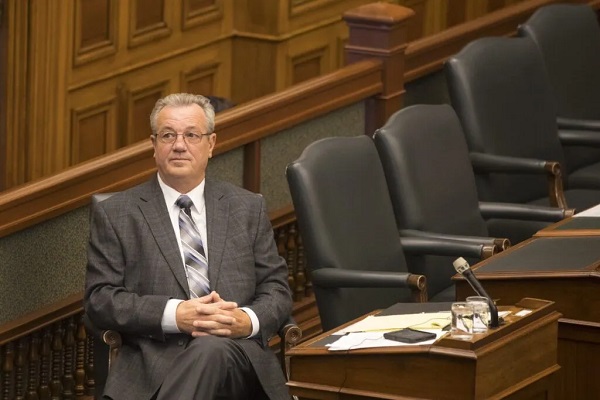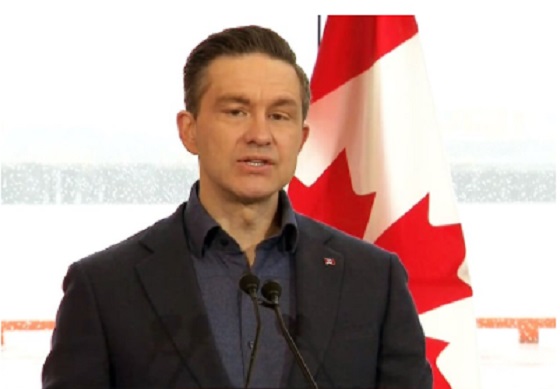National
Erin O’Toole names Shadow Cabinet

The Honourable Erin O’Toole, Leader of Canada’s Conservatives and of the Official Opposition, today announced the Conservative Shadow Cabinet for the second session of the 43rd Parliament.
“Today, I am proud to present the Conservative government in waiting that will defeat Justin Trudeau’s corrupt Liberal government in the next election,” O’Toole said. “In the coming weeks, we will be presenting a plan to put hardworking Canadians first, lead our nation out of this crisis and rebuild our great country.”
Conservative House of Commons Leadership Team:
- Deputy Leader: Hon. Candice Bergen (Portage – Lisgar, Manitoba)
- Quebec Political Lieutenant: Richard Martel (Chicoutimi – Le Fjord, Quebec)
- House Leader of the Official Opposition: Gérard Deltell (Louis-Saint-Laurent, Quebec)
- Chief Opposition Whip: Blake Richards (Banff – Airdrie, Alberta)
- Deputy House Leader of the Official Opposition: Karen Vecchio (Elgin – Middlesex – London, Ontario)
- Deputy Opposition Whip: Alex Ruff (Bruce – Grey – Owen Sound, Ontario)
- Caucus-Party Liaison: Hon. Tim Uppal (Edmonton Mill Woods, Alberta)
- Question Period Coordinator: Eric Duncan (Stormont – Dundas – South Glengarry, Ontario)
- National Caucus Chair: Tom Kmiec (Calgary Shepard, Alberta)
Conservative Shadow Cabinet:
- Leona Alleslev (Aurora – Oak Ridges – Richmond Hill, Ontario) – National Security Committee
- Rob Morrison (Kootenay – Columbia, British Columbia) – National Security Committee
- Lianne Rood (Lambton – Kent – Middlesex, Ontario) – Shadow Minister for Agriculture and Agri-Food
- Alain Rayes (Richmond – Arthabaska, Quebec) – Shadow Minister for Canadian Heritage, Official Languages & Quebec Economic Development
- Cathy McLeod (Kamloops – Thompson – Cariboo, British Columbia) – Shadow Minister for Crown-Indigenous Relations
- Dane Lloyd (Sturgeon River – Parkland, Alberta) – Shadow Minister for Digital Government
- Kenny Chiu (Steveston – Richmond East, British Columbia) – Shadow Minister for Diversity and Inclusion and Youth
- Warren Steinley (Regina – Lewvan, Saskatchewan) – Shadow Minister for Economic Development & Internal Trade
- Hon. Peter Kent (Thornhill, Ontario) – Shadow Minister for Employment, Workforce Development and Disability Inclusion
- Dan Albas (Central Okanagan – Similkameen – Nicola, British Columbia) – Shadow Minister for Environment and Climate Change
- Michael Barrett (Leeds – Grenville – Thousand Islands and Rideau Lakes, Ontario) – Shadow Minister for Ethics
- Tracy Gray (Kelowna – Lake Country, British Columbia) – Shadow Minister for Export Promotion & International Trade
- Jamie Schmale (Haliburton – Kawartha Lakes – Brock, Ontario) – Shadow Minister for Families, Children and Social Development
- Hon. Pierre Poilievre (Carleton, Ontario) – Shadow Minister for Finance
- Richard Bragdon (Tobique – Mactaquac, New Brunswick) – Shadow Minister for Fisheries, Oceans and the Canadian Coast Guard
- Hon. Michael Chong (Wellington – Halton Hills, Ontario) – Shadow Minister for Foreign Affairs
- Hon. Michelle Rempel Garner (Calgary Nose Hill, Alberta) – Shadow Minister for Health
- Brad Vis (Mission – Matsqui – Fraser Canyon, British Columbia) – Shadow Minister for Housing
- Raquel Dancho (Kildonan – St. Paul, Manitoba) – Shadow Minister for Immigration, Refugees and Citizenship
- Gary Vidal (Desnethé – Missinippi – Churchill River, Saskatchewan) – Shadow Minister for Indigenous Services
- Hon. Andrew Scheer (Regina – Qu’Appelle, Saskatchewan) – Shadow Minister for Infrastructure and Communities
- James Cumming (Edmonton Centre, Alberta) – Shadow Minister for Innovation, Science and Industry
- Chris d’Entremont (West Nova, Nova Scotia) – Shadow Minister for Intergovernmental Affairs & Atlantic Canada Opportunities Agency (ACOA)
- Garnett Genuis (Sherwood Park – Fort Saskatchewan, Alberta) – Shadow Minister for International Development & Human Rights
- Hon. Rob Moore (Fundy Royal, New Brunswick) – Shadow Minister for Justice and the Attorney General of Canada
- Mark Strahl (Chilliwack – Hope, British Columbia) – Shadow Minister for Labour
- Hon. Erin O’Toole (Durham, Ontario) – Shadow Minister for Middle Class Prosperity
- James Bezan (Selkirk – Interlake – Eastman, Manitoba) – Shadow Minister for National Defence
- Greg McLean (Calgary Centre, Alberta) – Shadow Minister for Natural Resources & Canadian Northern Economic Development Agency (CanNor)
- Philip Lawrence (Northumberland – Peterborough South, Ontario) – Shadow Minister for National Revenue
- Eric Melillo (Kenora, Ontario) – Shadow Minister for Northern Affairs & Federal Economic Development Initiative for Northern Ontario (FedNor)
- Marilyn Gladu (Sarnia – Lambton, Ontario) – President of the Queen’s Privy Council & Federal Economic Development Agency for Southern Ontario (FedDev Ontario)
- Shannon Stubbs (Lakeland, Alberta) – Shadow Minister for Public Safety and Emergency Preparedness
- Pierre Paul-Hus (Charlesbourg – Haute-Saint-Charles, Quebec) – Shadow Minister for Public Services and Procurement
- John Nater (Perth – Wellington, Ontario) – Shadow Minister for Rural Economic Development
- Rosemarie Falk (Battlefords – Lloydminster, Saskatchewan) – Shadow Minister for Seniors
- Pat Kelly (Calgary Rocky Ridge, Alberta) – Shadow Minister for Small Business & Western Economic Diversification (WD)
- Stephanie Kusie (Calgary Midnapore, Alberta) – Shadow Minister for Transport
- Luc Berthold (Mégantic – L’Érable, Quebec) – Shadow Minister for Treasury Board
- John Brassard (Barrie – Innisfil, Ontario) – Shadow Minister for Veterans Affairs
- Jag Sahota (Calgary Skyview, Alberta) – Shadow Minister for Women and Gender Equality
- Todd Doherty (Cariboo – Prince George, British Columbia) – Special Advisor to the Leader on Mental Health and Wellness
- Tony Baldinelli (Niagara Falls, Ontario) – Special Advisor to the Leader on Tourism Recovery
Justice
Canadian government sued for forcing women to share spaces with ‘transgender’ male prisoners

The Edmonton Institution for Women, one of six women’s corrections facilities in Canada (Photo credit: The Canadian Press/Jason Franson)
The Justice Centre for Constitutional Freedoms announces that a lawsuit has been launched against the Federal Government, seeking an end to the practice of forcibly confining female inmates of federal prisons with trans-identifying male inmates. The lawsuit claims that this practice is cruel and unusual punishment and violates the Charter rights of female inmates, including “their right to be protected from mental, physical, and sexual abuse…”
The lawsuit was filed on behalf of the national and non-partisan organization Canadian Women’s Sex-Based Rights (CAWSBAR) with the Federal Court of Canada in Toronto on April 7, 2025.
Since 2019, CAWSBAR has advocated for a Canada “where women and girls can be assured that their sex-based rights to bodily privacy ,dignity, fairness, and security are upheld both in law and in public policy.”
Their lawsuit takes aim at the Correctional Service Canada’s Commissioner’s Directive 100: Gender Diverse Offenders, which permits the practice of transferring trans-identifying male inmates to any of six women’s prisons across Canada. CAWSBAR is asking the Federal Court to declare that this Directive is of no force or effect.
Their lawsuit references an extensive list of physical and psychological harms female inmates have suffered as a result of being forcibly confined with trans-identifying male prisoners, including sexual assaults, sexual harassment, beatings, stalking, and grooming.
Many female prisoners come from disadvantaged backgrounds that often include past physical and sexual abuse from males. The current practice of having both males and females attend the same group therapy sessions makes it difficult for female inmates to fully participate in the treatment they seek. In advancing CASWBAR’s claim, lawyers will provide the court with evidence of psychological and physical harms that often lead to Post Traumatic Stress Disorder, flashbacks of stressful violent and/or emotionally disturbing events involving men, anxiety, anger, depression, hopelessness, and suicidality.
Female inmates are reluctant to complain about these arrangements. The court document states that complaints “are often viewed by correctional officers and staff as harassment, intolerance, and/or ‘transphobia.’ Female inmates do not speak out for fear of an entry on their institutional record, which will eventually be considered by the Parole Board of Canada, and which could impact the decision to grant or not grant parole.”
CAWSBAR is not the first organization to report on the risks associated with forcibly confining female inmates alongside trans-identifying males. According to 2023 research from the Macdonald-Laurier Institute, “More than 90% (55 of 61) of [trans-identified male] prisoners were incarcerated for violent offences. Of the group, nearly half (25) had a most serious offence that was homicide related and a third (18) had a most serious offense that was sexual in nature. In comparison, fewer than three-in-10 (6 of 21) [trans-identified females] were convicted of homicide related offences. This proportion of [trans-identified males] incarcerated for sexual and homicide-related offences is extraordinarily high compared to the general female prison population.”
Prior to 2017, only males who had completed sex reassignment surgery could be transferred to a women’s prison.
In October 2016, however, Parliament passed Bill-16, which amended the Canadian Human Rights Act to include gender identity and gender expression as prohibited grounds of discrimination. The Corrections and Conditional Release Act was also amended to include gender identity and expression as prohibited grounds of discrimination. Bill-16 became law on June 19, 2017, and Correctional Service Canada responded by drafting policies that authorized the transfer into women’s prisons of males who identify as women but have not necessarily undergone any surgical transitions.
The current policy, Commissioner’s directive 100: Gender diverse offenders, came into effect in May 2022.
CAWSBAR’s lawsuit argues that the current practice violates the constitutionally protected rights of female inmates. Section 7 of the Canadian Charter of Rights and Freedoms guarantees female inmates the right to life, liberty, and security of the person. Section 12 guarantees the right not to be subjected to any cruel and unusual treatment. Section 15 guarantees equality before and under the law as well as the right not to be discriminated against on the basis of sex.
Their lawsuit also references section 28, which reads, “Notwithstanding anything in this Charter, the rights and freedoms referred to in it are guaranteed equally to male and female persons.”
Heather Mason is a CAWSBAR board member and former inmate at the Grand Valley Institution for Women in Kitchener, Ontario. She explained the reason for her organization’s involvement and her personal motivation. “We initiated this action,” she stated, “to highlight the federal government’s failure to protect women and to raise public awareness about the cruel and unusual punishment that incarcerated women endure as a result of this transfer policy,” she says.
“This matter is especially important to me as a former federal prisoner,” Ms. Mason continued, “I firmly believe that all women are entitled to sex-based rights and protections as specified in the Canadian Charter of Rights and Freedoms.”
John Carpay, President of the Justice Centre, stated, “This lawsuit is a pivotal stand for the safety and dignity of female inmates, challenging a policy that disregards their Charter-protected rights and exposes them to intolerable harm. It underscores the urgent need to prioritize the security of vulnerable women over ideological directives.”
COVID-19
Randy Hillier wins appeal in Charter challenge to Covid lockdowns

Former Ontario Member of Provincial Parliament Randy Hillier in the Ontario Legislature (Photo credit: The Canadian Press/Chris Young)
The Justice Centre for Constitutional Freedoms is pleased that the Ontario Court of Appeal has accepted former Ontario MPP Randy Hillier’s appeal and overturned a lower court ruling that had dismissed his Charter challenge to Ontario’s lockdown regulations. These regulations were in effect during the 2021 Covid lockdowns.
The decision was released by the Ontario Court of Appeal on Monday, April 7, 2025.
In the spring of 2021, Mr. Hillier attended peaceful protests in Kemptville and Cornwall, Ontario. He spoke about the importance of the Canadian Charter of Rights and Freedoms and the harms caused by the province’s lockdown regulations. The government’s health orders made it illegal for even two people to assemble together outdoors: a blatant and unjustified restriction of the Charter section 2(c) freedom of peaceful assembly. Other provinces allowed five or ten or more people to gather together outdoors.
Mr. Hillier has outstanding charges in Kemptville, Cornwall, Peterborough, Belleville, and Smith Falls. Prosecutors in those jurisdictions are waiting to see the results of this Charter challenge. Mr. Hillier has faced similar charges in many other jurisdictions across Ontario, but these have been stayed or withdrawn at the request of the respective prosecutors.
Mr. Hillier defended himself against the tickets that were issued to him for violating lockdown restrictions by arguing that these lockdown regulations were unjustified violations of Charter section 2(c), which protects freedom of peaceful assembly.
Four expert reports were filed to support Mr. Hillier’s case, including the report of Dr. Kevin Bardosh, which extensively reviewed the many ways in which lockdowns harmed Canadians. They showed alarming mental health deterioration during the pandemic among Canadians, including psychological distress, insomnia, depression, fatigue, suicidal ideation, self-harm, anxiety disorders and deteriorating life satisfaction, caused in no small part by prolonged lockdowns. Many peer-reviewed studies show that mental health continued to decline in 2021 compared to 2020. The expert report also provides abundant data about other lockdown harms, including drug overdoses, a rise in obesity, unemployment, and the destruction of small businesses, which were prevented from competing with big-box stores.
Justice Joseph Callaghan dismissed that challenge in a ruling issued November 22, 2023. Notably, Justice Callaghan did not reference any evidence of lockdown harms that Dr. Bardosh had provided to the court. Without reasons, the court declared that Dr. Bardosh is “not a public health expert” and then ignored the abundant evidence of lockdown harms.
Lawyers for Mr. Hillier filed a Notice of Appeal with the Ontario Court of Appeal on December 22, 2023.
Mr. Hillier’s Appeal argued that, among other things, Justice Callaghan erred in applying the Oakes test. As the Notice of Appeal states, Justice Callaghan “fail[ed] to recognize that a complete ban on Charter protected activity is subject to a more onerous test for demonstrable justification at the minimal impairment and proportionality branches of Oakes.”
The Oakes test was developed by the Supreme Court of Canada in the 1986 case R. v. Oakes, as a way to evaluate if an infringement of a Charter right can be demonstrably justified in a free and democratic society. That test has three parts. The first requires that the means be rationally connected to the objective. The second is that it should cause minimal impairment to the right. The third is proportionality, in the sense that the objective of impairing the right must be sufficiently important.
Mr. Hillier’s Appeal focused on the second part of the Oakes test: whether the regulations were minimally impairing of Mr. Hillier’s 2(c) freedom where they effectively banned all peaceful protest.
Justice Centre President John Carpay stated, “It is refreshing to see a court do its job of protecting our Charter freedoms, by holding government to a high standard. There was no science behind Ontario’s total ban on all outdoor protests.”
-

 conflict1 day ago
conflict1 day agoZelensky Alleges Chinese Nationals Fighting for Russia, Calls for Global Response
-

 2025 Federal Election1 day ago
2025 Federal Election1 day agoHarper Endorses Poilievre at Historic Edmonton Rally: “This Crisis Was Made in Canada”
-

 Energy2 days ago
Energy2 days agoEnergy group urges Trump administration to restock oil reserves
-

 Business2 days ago
Business2 days agoTrump eyes end of capital gains tax in 2025
-

 Bruce Dowbiggin2 days ago
Bruce Dowbiggin2 days agoBettman Gives Rogers Keys To The Empire. Nothing Will Change
-

 2025 Federal Election2 days ago
2025 Federal Election2 days agoPoilievre Will Bring in ‘One and Done’ Resource Approvals, and Ten Specific Projects Including LNG Canada Phase II
-

 2025 Federal Election1 day ago
2025 Federal Election1 day agoAn In-Depth Campaign Trail “Interview” With Pierre Poilievre
-

 Alberta15 hours ago
Alberta15 hours agoAlberta’s embrace of activity-based funding is great news for patients









